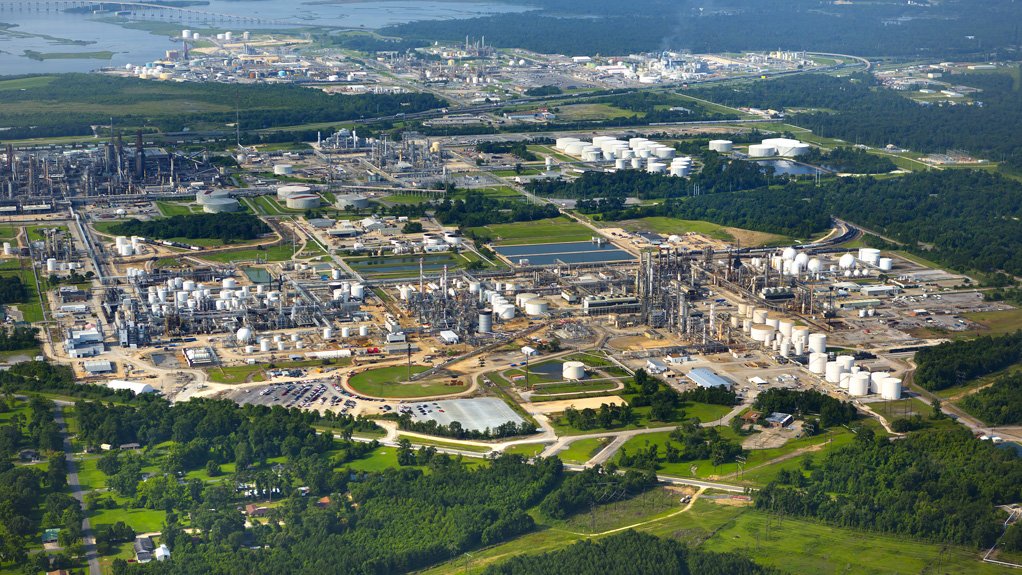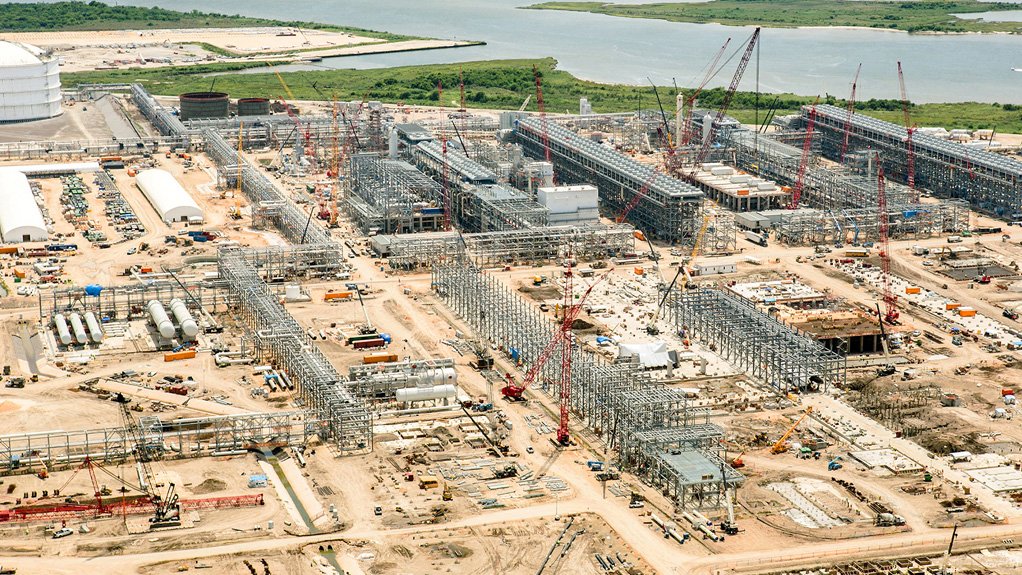Lake Charles is value accretive in the long term



LAKE CHARLES Sasol's Louisianan chemicals project is adjacent to its current chemicals operation
The $11-billion Lake Charles chemicals project is currently under construction, and is expected to be completed by the end of 2019
Despite the announcement in August revising the cost estimate of its Lake Charles chemicals project (LCCP) by about $2.9-billion, South African petrochemicals giant Sasol remains confident that the project is value accretive to shareholders in the long term.
The project, located adjacent to Sasol’s current chemicals operations in Louisiana, in the US, consists of a 1.5-million-ton-a-year ethane cracker, and six downstream chemicals projects. The downstream projects include two large polymers plants, an ethylene oxide/ethylene glycol plant, and three smaller, higher-value derivative plants.
The LCCP is currently under construction with the ethane cracker expected to reach beneficial operation in the second half of 2018. This will enable about 80% of the total output from LCCP to reach beneficial operation later in 2018 and in early 2019. The remaining volumes from the other derivative units will reach beneficial operation by the second half of 2019.
The company states that, regardless of the cost increase, the LCCP remains an attractive investment. It notes that project returns over the remaining construction period are still above the hurdle rate, which ensures that the project will – at the very least – break even.
Further, the attractive position of the LCCP on the global ethylene cost curve places the operation in a competitive position to successfully weather market volatility. The production of low-cost polyethylene is expected to improve the company’s earnings stability, in addition to increasing profit margins. Lastly, the company anticipates earnings growth as and when the LCCP’s technology and application development enable the transition from lower to higher value products.
“This investment will transform Sasol’s Lake Charles site into an integrated, multiasset site that will allow fixed and infrastructure costs to be spread over multiple product lines, and provide opportunities for investment in additional downstream chemicals facilities in the future,” the company states.
Sasol anticipates that the ethane cracker and derivatives project will employ more than 5 000 construction workers at its peak, and create more than 500 full-time positions and thousands of indirect jobs across Louisiana.
Revised Cost Estimate
In order to achieve the aims of the company’s low oil-price response plan, Sasol announced in March that it would compile a detailed review of the LCCP, which would allow it to pace the execution of the project in a manner that would support the response plan.
The review concluded in August and Sasol confirmed that the revised capital cost of the LCCP was estimated at $11-billion – a significant increase from the 2014 estimate of $8.1-billion.
The capital expenditure (capex) increase is mostly owed to construction delays, higher labour costs, and quantities of bulk materials surpassing those included in the original estimate.
In the LCCP review, Sasol noted that site and civil costs had increased by $750-million, owing to the need for further groundwork as a result of poorer than anticipated subsurface conditions. Further, significant weather delays due to 50% more rainy days than the 10-year average for the region, contributed.
Meanwhile, engineering, procurement and construction management (EPCM) contactor costs rose by $680-million and labour costs increased by $670-million.
The site and civil works are now complete and the operations are less exposed to adverse weather. Moreover, Sasol states that the fabrication of the modules and piping spool pieces are well advanced. This, together with the detailed review, results in a high degree of certainty for the project cost and schedule.
Sasol notes that the overall project is about 50% complete with engineering about 85% complete, procurement of equipment nearly 100% committed and bulk materials procurement about two-thirds committed.
The company notes that it has implemented several changes to ensure that the project is completed within the revised $11-billion capital cost guidance. To mitigate further costs and project delays, Sasol made key project management changes, specifically the deployment of three experienced Sasol project personnel to oversee the EPCM.
The company has also made improvements to the management of work packages and its contracting strategies have been realigned to ensure that the desired level of cost and productivity is achieved.
At the release of its annual financial results last month, Sasol joint CEOs Bongani Nqwababa and Stephen Cornell indicated that Sasol’s 2017 capex estimate increased by R2-billion on previous guidance, largely attributable to the revised LCCP estimate and the impact of the weakening rand. Capex for 2018 is forecast to be R60-billion.
Nqwababa added that the LCCP is funded through bank facilities of $4-billion, with the balance arising from “corporate”, including the use of $2.5-billion in offshore cash holdings, as well as other dollar-based facilities.
Article Enquiry
Email Article
Save Article
Feedback
To advertise email advertising@creamermedia.co.za or click here
Announcements
What's On
Subscribe to improve your user experience...
Option 1 (equivalent of R125 a month):
Receive a weekly copy of Creamer Media's Engineering News & Mining Weekly magazine
(print copy for those in South Africa and e-magazine for those outside of South Africa)
Receive daily email newsletters
Access to full search results
Access archive of magazine back copies
Access to Projects in Progress
Access to ONE Research Report of your choice in PDF format
Option 2 (equivalent of R375 a month):
All benefits from Option 1
PLUS
Access to Creamer Media's Research Channel Africa for ALL Research Reports, in PDF format, on various industrial and mining sectors
including Electricity; Water; Energy Transition; Hydrogen; Roads, Rail and Ports; Coal; Gold; Platinum; Battery Metals; etc.
Already a subscriber?
Forgotten your password?
Receive weekly copy of Creamer Media's Engineering News & Mining Weekly magazine (print copy for those in South Africa and e-magazine for those outside of South Africa)
➕
Recieve daily email newsletters
➕
Access to full search results
➕
Access archive of magazine back copies
➕
Access to Projects in Progress
➕
Access to ONE Research Report of your choice in PDF format
RESEARCH CHANNEL AFRICA
R4500 (equivalent of R375 a month)
SUBSCRIBEAll benefits from Option 1
➕
Access to Creamer Media's Research Channel Africa for ALL Research Reports on various industrial and mining sectors, in PDF format, including on:
Electricity
➕
Water
➕
Energy Transition
➕
Hydrogen
➕
Roads, Rail and Ports
➕
Coal
➕
Gold
➕
Platinum
➕
Battery Metals
➕
etc.
Receive all benefits from Option 1 or Option 2 delivered to numerous people at your company
➕
Multiple User names and Passwords for simultaneous log-ins
➕
Intranet integration access to all in your organisation




















